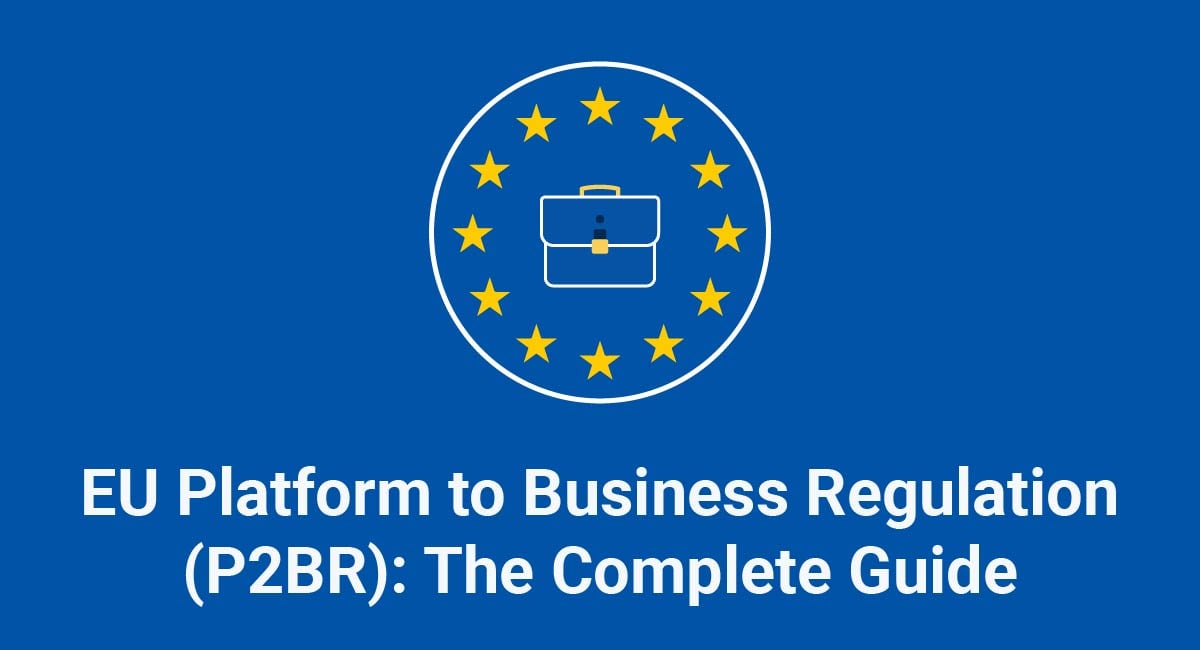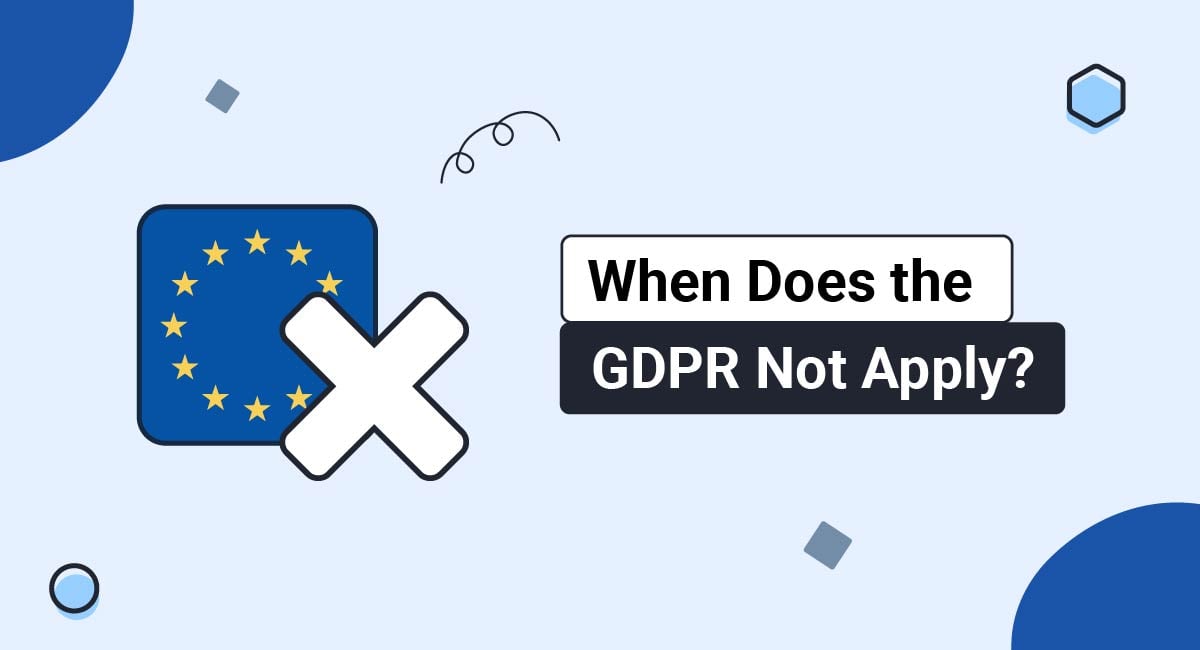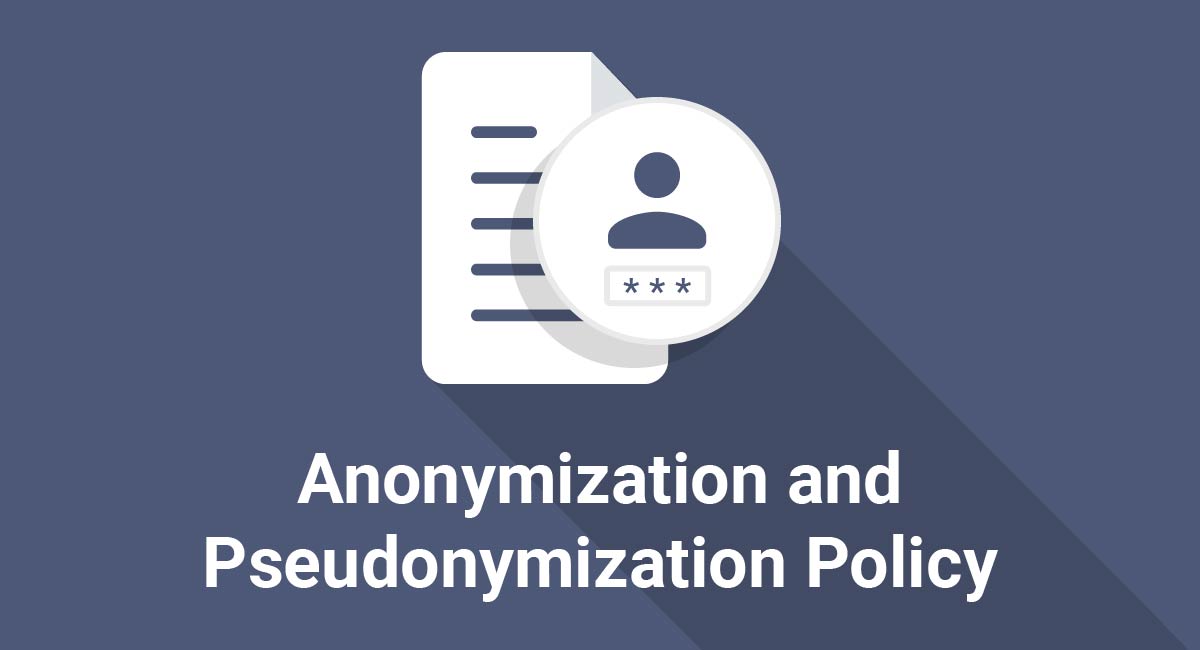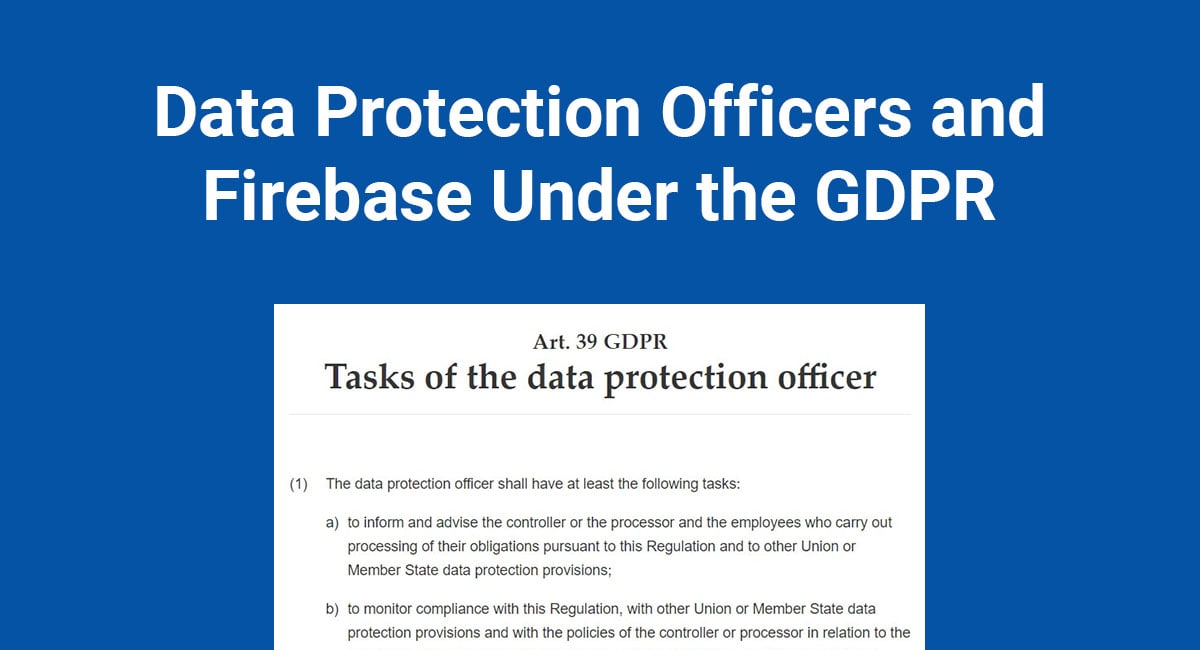The EU Platform to Business Regulation (P2BR or P2B Regulation) is a crucially important law covering B2C (business to consumer) platforms and search engines.
The P2BR requires platforms to overhaul their Terms and Conditions, provide a statement of reasons whenever they restrict, suspend, or terminate a business user's account, and set up internal complaint-handling and mediation processes.
Search engines must provide transparent information about how they rank corporate website users in search results.
This comprehensive guide to the P2BR will help you understand whether the law applies to you, whether you can take advantage of the small business exemptions, and what you need to do to comply with the law.
- 1. Who is Covered by the P2BR?
- 1.1. Examples of OIS Providers
- 1.2. Definition of "OIS Provider"
- 1.2.1. What is an "Information Society Service?"
- 1.2.2. What is a "Consumer?"
- 1.2.3. What Does "Irrespective of Where Those Transactions are Concluded" Mean?
- 1.2.4. What is a "Contractual Relationship?"
- 1.3. Examples of Businesses that are Not OIS Providers
- 1.4. Definition of a "Search Engine"
- 1.5. Does the P2BR Apply to Non-EU Companies?
- 1.6. Does the P2BR Apply to Small Businesses?
- 2. P2BR Requirements for OIS Providers
- 2.1. Terms and Conditions: Content
- 2.1.1. Ranking
- 2.1.2. Ancillary Goods and Services
- 2.1.3. Differentiated Treatment
- 2.1.4. Access to Data
- 2.2. Terms and Conditions: Changes and Termination
- 2.3. Complaints and Mediation
- 2.3.1. Complaint-Handling System
- 2.3.2. Mediators
- 2.4. Restricting, Suspending, or Terminating Accounts
- 2.4.1. Restricting or Suspending an Account
- 2.4.2. Terminating an Account
- 2.4.3. Statement of Reasons
- 3. P2BR Requirements for Search Engines
- 4. Summary
Who is Covered by the P2BR?
The P2BR applies to online intermediation service providers (OIS providers) and search engines from July 2020.
Examples of OIS Providers
The P2BR provides some examples of OIS providers at Section 11:

Examples of the sorts of businesses that can be OIS providers under the P2BR include:
- Online marketplaces (such as eBay, Amazon, or Etsy)
- Collaborative marketplaces with business users (such as hotel booking websites)
- App stores (such as Google Play or the App Store)
- Price comparison websites
- Social media platforms provided for businesses (such as Facebook Pages)
Definition of "OIS Provider"
Still not sure if you qualify as an OIS provider? Here's the full definition at Section 2 (2) of the P2BR:

Your business is an OIS provider if all of the following apply:
- You qualify as an "information society service" under Directive (EU) 2015/1535
- You provide a platform allowing business users to offer goods or services to consumers
- Your platform facilitates direct transactions between business users and consumers (irrespective of where those transactions are concluded)
- You have a contractual relationship with business users
Let's look at some of the above terms in a little more detail.
What is an "Information Society Service?"
An OIS provider must be an "information society service." Most online services are information society services under EU law, as long as they operate:
- For profit (whatever the source)
- At a distance
- By electronic means
- At the individual request of the recipient
Apps, programs, and many websites can be types of information society services.
What is a "Consumer?"
An OIS provider facilitates direct transactions between business users and consumers. According to Article 2 (4) of the P2BR, a "consumer" is "any natural person who is acting for purposes which are outside this person's trade, business, craft, or profession."
Therefore, if your platform allows business users to offer goods or services exclusively to other businesses (a B2B platform), the P2BR probably doesn't apply to you.
What Does "Irrespective of Where Those Transactions are Concluded" Mean?
An OIS provider facilitates direct transactions between business users and consumers, "irrespective of where those transactions are concluded." This means that the transaction between a business user and a consumer might take place:
- On your platform
- On the business user's website
- Offline (e.g. on the business user's premises)
In other words, your platform doesn't have to provide the ability to process an actual transaction between business users and consumers to be covered by the P2BR. The consumer might make a payment to the business elsewhere.
What is a "Contractual Relationship?"
An OIS provider must have a contractual relationship with business users (rather than only with consumers).
For two parties to be in a contractual relationship, there must be some verifiable agreement between them, such as a set of Terms and Conditions. Note that the P2BR doesn't necessarily require there to be a written agreement.
Examples of Businesses that are Not OIS Providers
Section 11 of the P2BR includes many examples of businesses that don't fall under the definition of "OIS providers" and, therefore, are not covered by the P2BR:
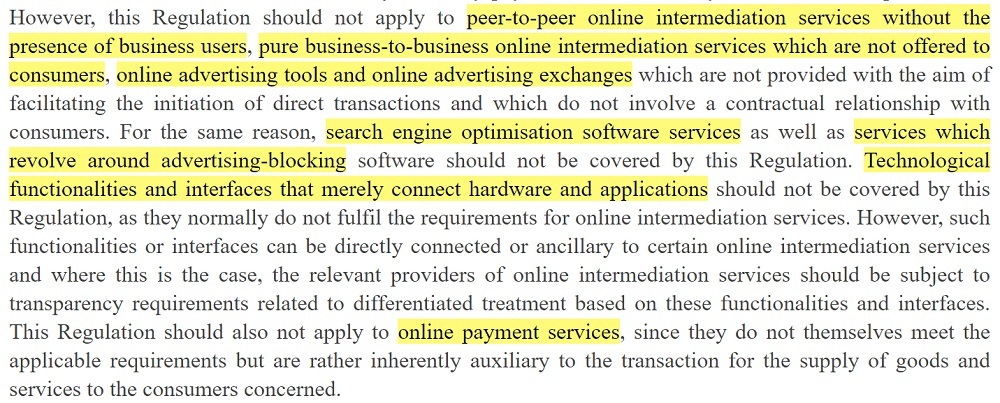
Businesses not covered by the P2BR include:
- Peer-to-peer intermediation services (with no presence of business users)
- Business-to-business intermediation services (with no presence of consumers)
- Online advertising tools
- Online advertising exchanges
- SEO software services
- Ad blocking software services
- Functionalities and interfaces that connect hardware and applications
- Online payment services
Definition of a "Search Engine"
Here's the definition of an "online search engine" at Article 2 (5) of the P2BR:

A service is a "search engine" if all of the following apply:
- It is a digital service
- It allows users to input queries on any subject
- It aims to search all websites (or all websites in a given language)
- It returns information relating to the query
Search engines include DuckDuckGo, Startpage, Ecosia, Seznam, Bing, and (of course) Google.
Search engines facilitate transactions between consumers and "corporate website users," i.e. businesses whose websites are indexed, crawled, or tagged by search engines.
Does the P2BR Apply to Non-EU Companies?

Yes, much like other EU laws, such as the General Data Protection Regulation (GDPR), the P2BR applies to non-EU companies in certain circumstances.
The P2BR applies to any OIS provider or search engine if both of the following apply:
- It offers its services to business users in the EU, and
- Its business users offer goods or services to consumers in the EU
The location of the OIS provider or search engine is not relevant, so long as its business users and its business users' consumers are located in the EU.
Does the P2BR Apply to Small Businesses?
Yes, the P2BR applies to small businesses. However, your company may be exempt from some provisions of the P2BR if it meets both of the following conditions:
- It has a turnover of less than €10 million (approximately $11.9 million), and
- It has fewer than 50 employees
If you are a small business according to the definition above, you are exempt from two P2BR requirements:
- You don't have to set up an internal complaint-handling system
- You don't have to specify mediators in your Terms and Conditions
You can still do these things voluntarily if you wish.
P2BR Requirements for OIS Providers

First, we'll look at OIS providers, who have the most extensive requirements under the P2BR.
Terms and Conditions: Content
One of the core OIS provider requirements under the P2BR is having a clear and fair Terms and Conditions agreement.
Our Terms and Conditions Generator makes it easy to create a Terms and Conditions agreement for your business. Just follow these steps:
-
At Step 1, select the Website option or the App option or both.
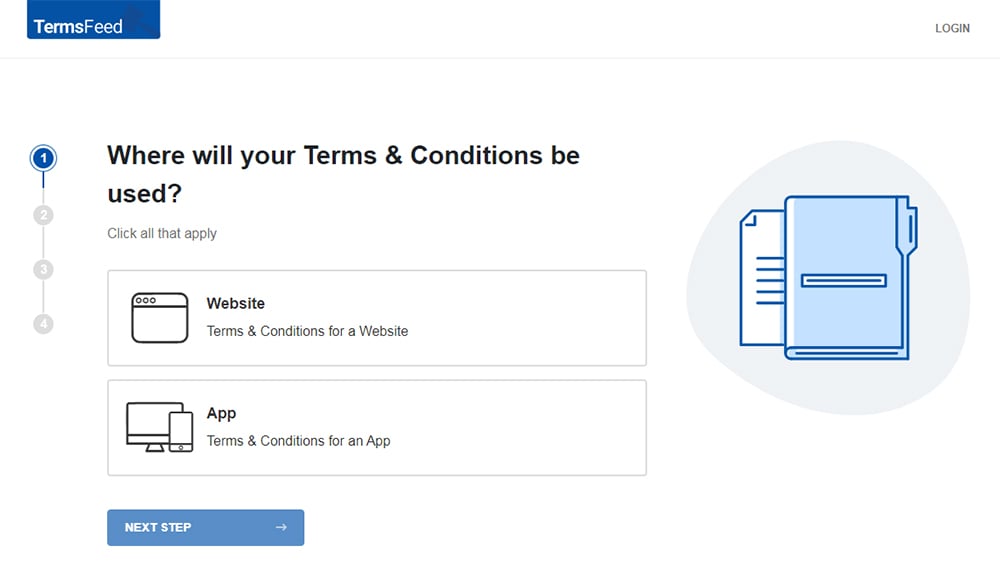
-
Answer some questions about your website or app.
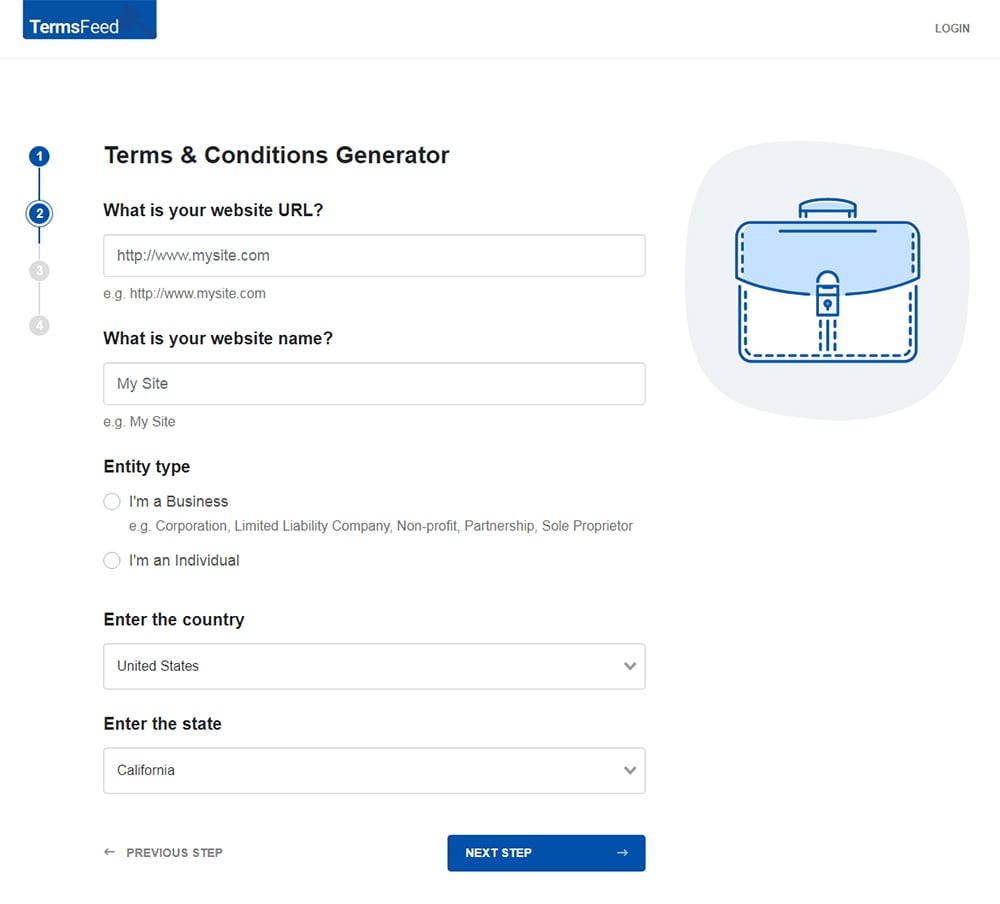
-
Answer some questions about your business.
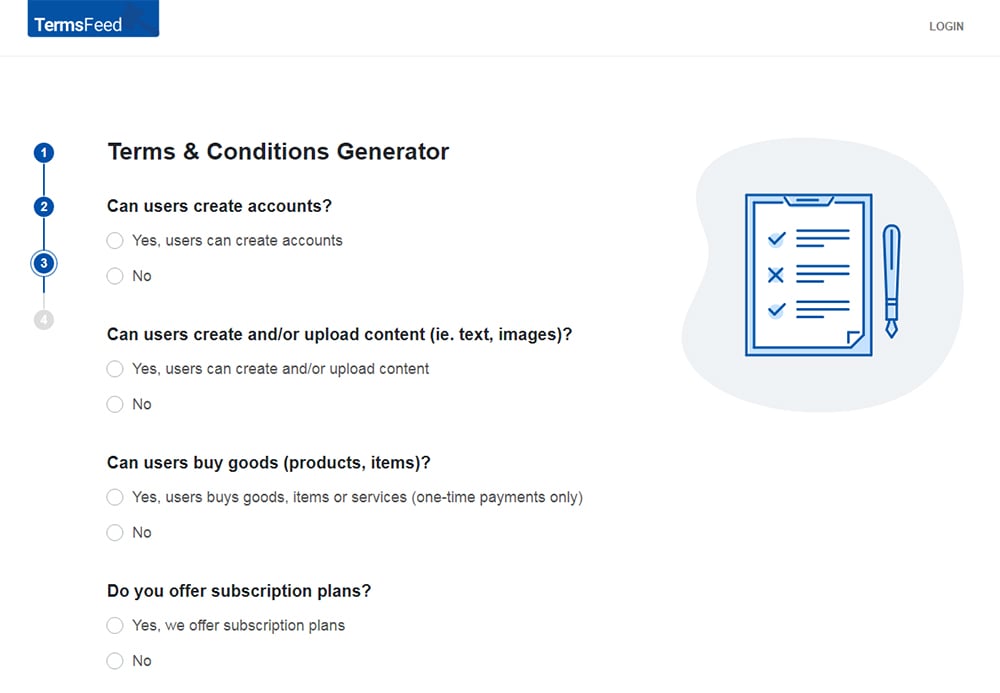
-
Enter the email address where you'd like the T&C delivered and click "Generate."
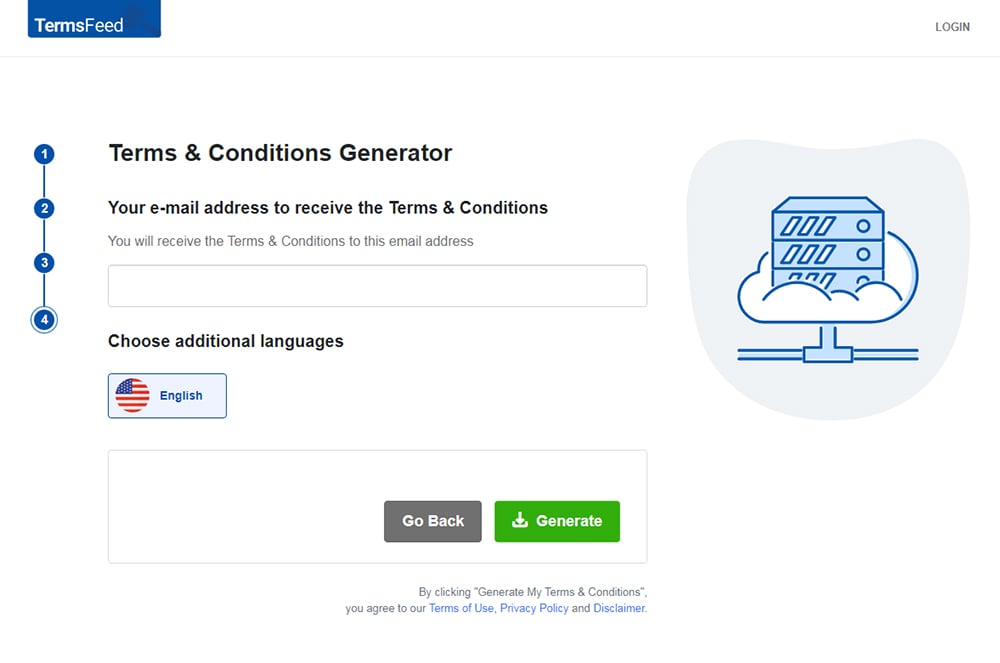
You'll be able to instantly access and download the Terms & Conditions agreement.
Under the P2BR, you must maintain Terms and Conditions that:
- Are written in "plain and intelligible language" (if any clauses in your Terms and Conditions aren't written in plain and intelligible language, you won't be able to enforce them against business users)
- Are easily accessible to business users at all stages of the commercial relationship
- List the grounds on which you may restrict, suspend, or terminate a business user's account (see below for the rules on account restrictions)
- Include information about any other distribution channels or affiliate programs through which you might market a business user's goods or services
- Explain how the agreement may affect a business user's intellectual property rights (note that you must not forbid a business user from displaying its logos/branding)
- Explain how business a user can terminate the contract
- Explain any restrictions you impose on a business user that prevent it from offering different conditions through other means (for example, if you don't allow a business user to sell its goods or services at a lower price via its own website)
- Explain whether you retain access to data that business users provide for or generate through the use of your platform (such as ratings or reviews) after your contract finishes
The P2BR also requires your Terms and Conditions to include information about the following concepts (we've provided more information about each of these things below):
- Ranking
- Ancillary goods or services
- Differentiated treatment
- Access to data
- Internal complaint-handling system
- Mediators
Ranking
Your Terms and Conditions must contain information about ranking: "the relative prominence given to the goods or services" on your platform. For example, if a consumer searches for a type of product, ranking affects which business user's products appear at the top of the list.
You must include the following information about ranking in your Terms and Conditions:
- An explanation of any parameters you use to determine the ranking of business users' goods or services and why you use these parameters
- An explanation of whether and how business users can pay (directly or indirectly) to influence their ranking
- Information on whether you rank your own goods or services (or those provided by companies you control) differently to goods or services offered by business users
Ancillary Goods and Services
Your Terms and Conditions must contain infmroation about "ancillary goods or services."
Ancillary goods or services are products that depend on the business user's main product in order to function, for example:
- Repair services
- Insurance
- Upgrades
- Customization tools
Your Terms and Conditions must explain:
- What types of ancillary goods or services you offer alongside a business user's goods or services
- Whether and how a business user can offer its own ancillary goods or services to consumers
Differentiated Treatment
If you provide your own goods or services (or the goods or services of companies you control) on your platform, your Terms and Conditions must explain whether you treat or rank these products differently from business users' goods or services.
This section of the P2BR is intended to reduce any unfair advantage you might gain over your businesses users through the provision of your platform.
Your Terms and Conditions must include the following information about differentiated treatment:
- Whether you have access to any data, including personal data, that business users provide for (or generate through) the use of your platform
- Any rankings or other settings that affect how consumers access your goods or services
- Whether there is any direct or indirect payment (monetary or otherwise) for the use of your platform
- Whether you charge for the any services, functionalities, or interfaces (such as operating systems) connected to the use of your platform
Access to Data
Your Terms and Conditions must explain how you access personal data or other data that business users or consumers provide for, or generate through, the use of your platform.
If you do have access to business users' or consumers' data, your Terms and Conditions must explain:
- What categories of data you can access (e.g., consumers' names, ratings, reviews)
- Whether a business user can access such data, and, if so, what categories of data it can access and under what conditions it can access it
- Whether the data is available in aggregate form, and, if so, what categories of data it can access and under what conditions it can access it
- Whether the data is shared with third parties, and how business users can opt out of this sharing of data (unless it is necessary in order to provide the platform)
Terms and Conditions: Changes and Termination

If you make changes to your Terms and Conditions, you must:
- Give business users at least 15 days' notice (unless there is a legal requirement or imminent danger that requires you to change them immediately)
- Give proportionately longer than 15 days' notice if the changes will disrupt business users' operations (for example, if you are removing entire features of your platform, or you require business users to adapt their goods or services)
- Give notice via a "durable medium," such as email
You won't be able to enforce any changes to your Terms and Conditions that do not comply with the P2BR's notice requirements.
A business user can waive their right to the 15-day notice period, for example by submitting new goods or services that attempt to comply with the changes before the end of the notice period.
If a business user doesn't wish to accept the changes to your Terms and Conditions, it may terminate its contract with you. This termination will normally take place within 15 days of the business user giving notice.
You must not make any changes to your Terms and Conditions that take retroactive effect unless:
- You are legally required to do so, or
- The changes benefit business users
Complaints and Mediation
Unless you are a small business, you must set up an internal complaint-handling system and appoint at least two mediators. These mechanisms are designed to help you resolve disputes with business users.
Complaint-Handling System
Your complaint-handling system must be:
- Free
- Accessible
- Fair
- Transparent
Your complaint-handling system must allow you to:
- Duly consider and follow-up on complaints to address any issues raised
- Process complaints swiftly and effectively
- Communicate the outcome of the complaint in plain and intelligible language
Businesses can complaint about a range of matters, including:
- Your alleged non-compliance with the P2BR
- Technical issues relating to your services
- The measures you have taken, or your behavior, in respect of the provision of your platform
So that business users can make informed choices about which platforms they want to work with, you must provide the following information to the public about your complaint-handling system, updated at least annually:
- How many complaints have been lodged
- The main types of complaints
- How long it took, on average, to process a complaint
- The outcomes of the complaints
Your Terms and Conditions must explain your complaint-handling system.
Mediators
You must choose at least two mediators to help settle disputes with business users. This is to prevent complaints from going to court.
Your mediators must be:
- Impartial
- Independent
- Affordable
- Accessible
- Knowledgeable about the relationship between OIS platforms and business users
- Able to communicate in the same language as your Terms and Conditions
- Able to handle disputes swiftly
Your mediators can be based outside of the EU, but only if you can guarantee that business users are afforded EU-equivalent rights and protections.
Your Terms and Conditions must name your chosen mediators.
Restricting, Suspending, or Terminating Accounts

The P2BR imposes rules that help ensure you treat business users fairly when restricting, suspending, or terminating their accounts.
Restricting or Suspending an Account
Restricting or suspending an account can include delisting items, removing items from search results, or "dimming" a business user, for example, by lowering their ranking.
You must provide a business user with a "statement of reasons" explaining your decision, either before or at the same time as restricting or suspending its account. You must also allow the business user to respond, for example, via your complaint-handling system.
Terminating an Account
Before you terminate a business user's account, you must provide 30 days' notice via a durable medium (e.g., email). You must also allow the business user to respond, for example, via your complaint-handling system.
You don't have to give 30 days notice if:
- You are legally required to terminate an account earlier
- You have the legal right to terminate an account earlier under an EU-compatible national law
- You can demonstrate that the business user has repeatedly violated your Terms and Conditions
You should always provide a statement of reasons explaining your decision at the start of the 30-day notice period, unless you are legally required not to do so, or you can demonstrate that the business user has repeatedly violated your Terms and Conditions.
Statement of Reasons
Your statement of reasons must contain the following information:
- The specific facts or circumstances that led to the decision
- Any third-party notices that contributed to the decision (if relevant)
- The ground for the decision (as listed in your Terms and Conditions)
You or the business user may wish to resolve the matter via your complaint-handling system or your mediators. Both parties must share the cost of mediation. Your mediators can determine who pays what proportion of the costs.
P2BR Requirements for Search Engines

The P2BR's requirements for search engines are less extensive than those for OIS providers.
Rather than providing corporate website users with a Terms and Conditions agreement, search engines must provide a publicly-available document that:
- A description of the main parameters that are most significant in determining ranking and the relative importance of these parameters
- An explanation of whether corporate website users can pay (directly or indirectly) to influence ranking
If your search engine promotes its own corporate websites (or corporate websites owned by companies in its control), you must include information about differentiated treatment in your publicly-available document.
If you receive a notice from a third party that affects a corporate website user's ranking, you must allow the corporate website user to inspect the notice.
Summary
Any OIS provider covered by the P2BR must:
- Update its Terms and Conditions agreement
- Give 30 days' notice before terminating a business user's account
- Provide a statement of reasons explaining any restriction, suspension, or termination of a business user's account
Unless it is a small business, an OIS provider must also:
- Set up a complaint-handling system
- Appoint two or more mediators
Any search engine covered by the P2BR must provide a publicly-available document explaining its policies on ranking corporate website users.

Comprehensive compliance starts with a Privacy Policy.
Comply with the law with our agreements, policies, and consent banners. Everything is included.
